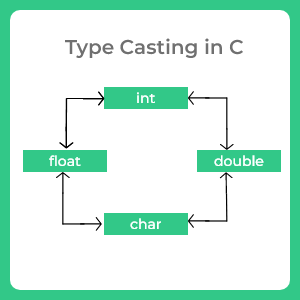0
Notifications Mark All Read
- Login
- Get Prime
TypeCasting in C
Introduction to TypeCasting
The method of typecasting in C involves utilizing the casting operator during program design to change one data type to another.
Depending on what we want the programme to perform, type casting causes the compiler to automatically switch from one data type to another.

Syntax:
int a; float b; b = (float) a;
Types of TypeCasting in C:
- Implicit typecasting
- Explicit typecasting
Implicit Typecasting:
In C, implicit type casting is used to change any variable’s data type without changing the value it stores.
Without changing any of the values kept in the data variable, it executes the conversions.
Explicit TypeCasting:
- The user converts types explicitly by using the (type) operator.
- The destination type’s ability to store the source value is checked at runtime prior to the conversion being carried out.
Example 1:
Run
#include<stdio.h>
int main()
{
int x= 19, y=2;
float div;
div=x/y;
printf("The output : %f\n",div);
return 0;
}
Output:
The output : 9.000000.
Advantages of Typecasting:
- Programmers can change one data type to another by using type casting.
- The program is made lighter by typecasting.
Example 2:
Run
#include<stdio.h>
int main()
{
int x = 19, y = 2;
char c = 'x';
double div;
div = (double)x / y;
c = c + 2;
printf("The output of Implicit typecasting : %c\n", c);
printf("The output of Explicit typecasting: %f", div);
return 0;
}
Output:
The output of Implicit typecasting : z The output of Explicit typecasting: 9.500000

 0
0

Login/Signup to comment